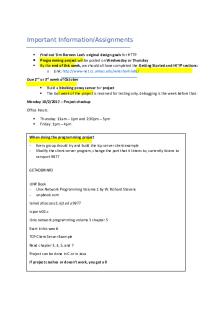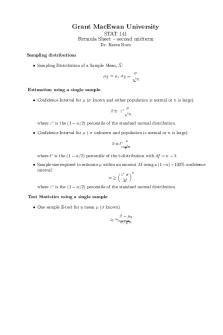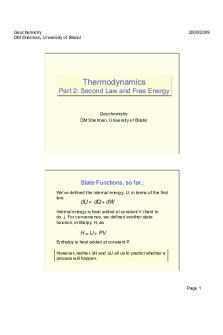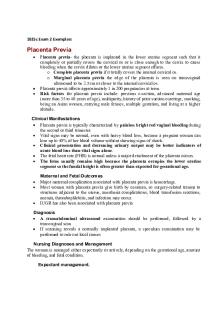SFV102 Lecture 2 Notes Kant PDF

| Title | SFV102 Lecture 2 Notes Kant |
|---|---|
| Author | Zwi Mulaudzi |
| Course | Introduction to Philosophical Ideas II |
| Institution | Nelson Mandela University |
| Pages | 9 |
| File Size | 194.5 KB |
| File Type | |
| Total Downloads | 13 |
| Total Views | 125 |
Summary
Lecture notes 2 Kant...
Description
Introduction to Philosophy
Lecture: Kant Kant argues that to be human means to be moral, and this means that humans cannot be completely determined, but must be free in some sense to make decisions for ourselves. But freedom is freedom to be good or evil. To be truly human, then is to submit ourselves to the duty to act morally. This means that to be truly human is to reach Enlightenment, which is to achieve autonomy and take responsibility for working out rationally how to act ethically.
Texts 1) Kant, I. “An answer to the question: What is Enlightenment? (1784)” http://www.english.upenn.edu/~mgamer/Etexts/kant.html 2) Kant, I. 1993. Grounding for the Metaphysics of Morals with On a supposed right to lie because of philanthropic concerns. Third Edition. Trans. James W. Ellington. Indianapolis: Hackett Publishing Company, 24-31. [ISBN-0-87220-167-8 Total Number of Pages: 78]
Key Points 1. Who was Kant? 2. Kant’s “Copernican Revolution” in answer to Descartes’ doubt 3. The problem of freedom and determinism 4. What is Enlightenment? (Kant, What is Enlightenment?) 5. Enlightenment and Autonomy (Kant, What is Enlightenment?) 6. Freedom from authority (Kant, What is Enlightenment?) 7. Autonomy and responsibility 8. Good and Evil 9. Deontology (an ethics of duty) (Kant Grounding 30) 10. The categorical imperative (Kant Grounding 25-27, 30)
11.
Glossary
1
Lecture Notes on Kant’s “What is Enlightenment?” 1.
Who was Kant?
Immanuel Kant was born in 1724 and died in 1804. Kant lived in the same town, Königsberg, all his life and only travelled to a few villages on its outskirts. He was brought up in a Pietist household. Pietism is a branch of Christianity that emphasises your personal responsibility for deep study of the Bible and dedicated religious practice as an indication of your knowledge. Pietism also stressed universal priesthood (everyone has a right to preach what they believe) and believed that all people should share in the spiritual government of the Church. This upbringing had an extremely important influence on Kant’s ethical and political philosophy.
When he was 16 he enrolled at the University of Königsberg, and he eventually became a Professor there. He published his first philosophical work in 1747 when he was 23 years old, and continued publishing books until late in life. Often people think of Kant as a late developer, because he published his most famous books, his three monumental Critiques after the age of 50. His Critique of Pure Reason, which deals mostly with epistemology, is also known as his First Critique. His Critique of Practical Reason, which deals mostly with ethics, is also called his Second Critique and his Critique of Judgement, which deals with natural teleology and aesthetics, is known as his Third Critique. Before writing these three great works, Kant made significant contributions in natural science, and he made important discoveries in the field of astronomy, firstly concerning the effects of oceanic tides on the speed at which the earth rotates, and secondly concerning the nature of the Solar System. He hypothesised that the origin of our Solar System was a nebula (an enormous gas cloud). He correctly explained the Milky Way and other star clusters in the galaxy in terms of his nebula theory. Kant seems to have lived a very strict and predictable life, and it is often repeated that people of Königsberg, could set their clocks according to his daily walks, which he took at exactly the same time every day. He did not marry or have children, but he is known to have been popular as a lunchtime companion and as a teacher. Although Kant did not travel around much, and lived a very quiet, regular life in a single town, his mind seemed to have been as broad and expansive as the universe. One of his often quoted sayings (From his Second Critique) is this:
“Two things fill the heart with renewed and increasing awe and reverence the more often and the more steadily that they are meditated on: the starry skies above me and the moral law inside me.”
2.
Kant’s “Copernican Revolution” in answer to Descartes’ doubt
Kant was deeply troubled about the state of philosophy since the furore created by Descartes. In his opinion it was the “scandal of philosophy” that we should have to rely on faith in God to verify the existence of the world around us and that philosophy should have no alternative, scientific proof its existence to offer those who doubt that there is a God. Kant’s answer to Descartes’ doubt appears in the first of his three famous Critiques, Critique of Pure Reason, and is known as his “Copernican revolution”. Copernicus was the scientist who proposed a revolutionary idea in cosmology. He asked the “what if” question. “What if we thought differently about things?” Before Copernicus, most people agreed with Aristotle and Ptolemy that the earth was the centre of the universe. But Copernicus asked: “what if we thought of the sun as the centre of the universe?” Then we could think of the planets arranged in orbits around the sun and we can plot the paths of their movements in a way that makes so much more sense. Kant asked a similar, revolutionary “what if?” question. Before Kant, most people agreed that objects in the world are just there and we passively register them, as if we were taking a mental photograph, or making a mental movie. On this assumption our question, along with Descartes, is this: “how do we know our “instruments” for registering the world (sensation, imagination and reasoning) are working well and giving us a true “picture” in our minds of the way the world really 2
is. But Kant asked: “what if that is just not how perception works?” “What if we actually use our mental ‘instruments’ or ‘faculties’ to shape our experience of things?” We have the power to process raw sense data so that we experience things in three dimensions. Not all creatures can do this. Some scientists are also suggesting that different creatures process light waves (raw sense data again) faster or slower depending on the metabolic rate (processing speed) in our visual cortex. This means that creatures like flies, that are tiny and have relatively simple nervous systems process light waves extremely fast and as a result their perceived reality, compared with a human, is slow. They see us moving in slow motion, while we see them buzzing off in an instant. This is why it is so hard for us to catch them. So, even without the aid of contemporary science, Kant asked a radically new question: “what if we can never know what the world “out there” is really like, because all we can ever know is what we have already shaped by our especially human spatial and temporal processing powers. We can still do science, he argued, because we can investigate exactly how our human powers function to form three-dimensional space and human time. Kant called what is “out there” – the source of all the sense data – the noumenal world. He called the world as it is perceived by humans the phenomenal world. In his estimation, we could establish a proper science of the phenomenal world, but the noumenal world remained forever outside of our understanding.
3.
The problem of freedom and determinism
This division between noumenal and phenomenal worlds was very important for Kant when he turned his thinking away from the problem of knowledge in his First Critique to the problem of ethics in his Second Critique, Critique of Practical Reason. You could sum up the problem he saw with ethics in three words: “ought implies can”. Kant saw that in everyday life, most mentally healthy people believe that humans ought to be moral. This is the same as saying we should be moral, or that we experience the injunction (the command) to be moral. Whenever you hear the word “should” or “ought” in a statement, then you know you are dealing with a “normative” statement. The fact that we feel guilty if we are not acting morally supports the argument that we believe we should be moral. But, Kant argued, if we feel we ought to be moral, then we have to find a way to show that we can be moral. But why would anyone think that humans can’t be moral? Well, this argument goes back to a line of philosophising that is taken up by Aristotle. Recall that Aristotle believed we are part of a world in which each thing (including a human) can be fully explained as the effect of the things that cause it, and these, in turn can be fully explained in terms of the things that cause them and so on until everything is fully explained. This captures the idea of a deterministic universe. Determinism is the modern name for a very old idea that comes from the “atomist” Democritus. Even before Aristotle, Democritus argued that everything in the universe, including human souls or minds, is made from atoms and we could (eventually) figure out the fixed laws that determine the behaviour of atoms. If this is true, then there is no room in the universe for chance or random events. Everything happens for a sufficient reason, every event has a proper cause, and once we know the laws we can accurately predict what will happen in every case. Think about what this kind of strict determinism might mean in relation to human behaviour! I murdered her because patriarchy sanctions woman abuse, because I had a traumatic childhood, because I responded instinctively to fear. None of it is my fault, there was no possible alternative outcome and I don’t have to take any responsibility for what I do. I had no choice. Even though Kant was a great supporter of Newtonian physics, which presupposes a deterministic physical universe, he found this outcome unacceptable. Determinism in human behaviour is not compatible with our strong sense that we should be moral. We can be moral only if we have the freedom of will to choose how to respond and behave and think. The problem of exactly how to understand determinism has become a gigantic philosophical problem as philosophers twist and turn trying to find a way to make two observed phenomena 3
compatible: physical determinism and human freedom of choice. It gets extremely complicated. (FYI see: A Taxonomy of Free Will Positions. Retrieved March 6, 2013, from Information Philosopher Web site http://www.informationphilosopher.com/freedom/taxonomy.html). Philosophical efforts make physical determinism compatible with freewill have been helped by quantum physics with allows for a degree of physical indeterminism at micro and macro levels, as well as the concept of “probability”. These ideas help because they allow for an element of chance in the universe. If we accept strict determinism, it means that there is just one possible future. By contrast, the idea that there can be chance events is tied to the idea that the future is unpredictable. In other words, there can be alternative futures. Different futures can be actualised depending on the choices we make now. This would be a contemporary way of showing that humans do have freedom of choice, that we are in some way free to make decisions for ourselves, and we do have the responsibility to choose to do good deeds rather than evil deeds. Kant did not have quantum physics to help him out of the freedom and determinism dilemma. What he tried to argue is that human freedom and physical determinism are compatible (we can have both at the same time, even though they are contradictory) if we think of ourselves as, in a sense, belonging to two different worlds. So, as physical beings, we belong to the deterministic phenomenal world, which is determined by Newton’s laws. All beings that only belong to the physical world have no choice in what they do. They just act according to instincts and can’t be moral. Nobody, for example, imprisons a cat for killing the lizards they refuse to eat, or a two-year old for being naked on the beach, because we don’t expect these creatures to have the ability to make informed choices. But humans develop further and at some point develop the ability to act not just from instincts, but from will. According to Kant, our will is part of the undetermined, nonspatial, timeless noumenal (or mental) world that includes God, freedom, and immortality. We can compare Kant’s noumenal world with Plato’s concept of the Soul, Descartes’ res cogitans and the timeless God’s eye-view of the Scholastics. Our ethical decisions are made in our souls outside of time and space, and they only become visible in the form of the actions we take, which obey the laws of nature. This division caused more questions and problems than it solved, which is probably one of the reasons why people are still struggling to come to terms with Kant. Another reason is that despite this shaky foundation, Kant offered us an interesting philosophy of human ethics that we still talk about as an option today. Kant, to reiterate, argues that to be human means to be moral, and this means that we humans cannot be completely determined, but must be free in some sense to make decisions for ourselves. Even though he did not give us a really good account of why we are free, we can operate from the observed fact that we do have at least some degree of freedom.
4.
What is Enlightenment?
Kant is known as a philosopher of “the Enlightenment”. “The Enlightenment” names a new thought-paradigm. A thought-paradigm is a way of thinking that guides an ethos (a way of living). In the Enlightenment, people began to adopt a new way of thinking and living, based on reason and science rather than tradition and religious faith. Enlightenment intellectuals were sick and tired of the culture of superstition, fear and intolerance, as well as the abuse of power by many in the Church and the State. The Enlightenment thinkers were strongly in favour of personal freedom and believed that allowing people the free use of their powers of reason would lead to fundamental intellectual, cultural and social reforms. In his essay “What is Enlightenment?” Kant argues that the motto of enlightenment is “have the courage to use your own understanding”, without guidance from another.
4
Kant argues that we are naturally free to use our reasoning powers without external guidance. At some point in child-development humans naturally evolve the capacity for self-awareness; that is, the ability to assess yourself, and your life and relationships, in relation to a projected ideal of what should be the case. With self-awareness we gain powers like delayed gratification, empathy and reasoning. These enable us to rise above our automatic, animal-like responses to external forces like instincts, stimulus response mechanisms, emotions, pleasures and pains. With self-awareness, we can also rise above our dependence on the authority of those around us (parents, teachers, pastors, siblings, peers and so on). What we gain, most importantly, is the power to choose. Kant calls this freewill. If I have freewill, it means I can decide which among my needs, wants and desires to satisfy or deny, which among my natural responses (e.g. desire or revulsion) to take seriously or dismiss, and which among those around me to help or hurt. For Kant, we achieve enlightenment when we become mature adults characterised by selfawareness, and when we make good use of our capacity to change, imagination to project a better world, and freedom to choose what to do. Kant argues that we remain immature and unenlightened if we deny these natural attributes. In his opinion, you undermine your humanity if you are unwilling to change, unable to see how things could be different from the way they are now, unwilling to consider how to improve yourself and your community, unwilling to take the responsibility of deciding what to do, and willing always to defer to the authority of others. 5.
Enlightenment and Autonomy
In Kant’s opinion, to become enlightened is to become “autonomous”. The word “autonomy” is put together from the word “autos” meaning self and “nomos” meaning law. If I am autonomous, I make the laws of my own behaviour for myself. Autonomy is not simple “agency”, the ability to just do what you like when you like. I am not being autonomous if I just refuse to follow any rules or principles at all. Autonomy involves the ability to decide for yourself which rules of behaviour to follow, no matter what the authorities are telling you to do. In other words, autonomy means the freedom to act as you see fit, subject to the constraints of reason. To be autonomous, you have to use your own power of reason to decide how best to act so that you do not cause harm to yourself or others.
6.
Freedom from authority
You don’t become mature, enlightened and autonomous just because you reach a certain age. In fact, many people who are old enough to be autonomous refuse to accept the responsibility to decide things for themselves. Many people demand guidance from another person, who is placed up there like a parent before children, a teacher before pupils, a ruler before subjects, a priest before a flock, a deity before the faithful supplicants. The belief driving this desire for guidance is that someone out there, older, bigger, wiser, than me, has the answers, knows what to do, and can offer me better solutions than I can find for myself. Kant is not convinced. He thinks that those adults who refuse to be autonomous and impose immaturity on themselves just lack courage and resolve. In fact, because you naturally can become mature or enlightened, it is your ethical duty to make sure that you do. If you refuse to do this, you are morally blameworthy. But why would people want to remain immature or unenlightened? Why would people refuse to become autonomous? Well, to claim autonomy means to make your own decisions about everything – not just the stuff you choose to think about. This is a massive responsibility. According to Kant, it takes courage and resolve to resist three kinds of constraints to autonomy.
Firstly, as pleasure-seeking beings, we have a natural tendency to take the easy road, and it is so much easier and safer (we think) to let others take the responsibility for making decisions. Internal constraints to autonomy, according to Kant include laziness and cowardice.
5
7.
Secondly, there are plenty of self-serving, power hungry leaders out there who benefit from keeping their flocks dumb, docile and obedient. To achieve autonomy in face of this constraint often means standing up courageously against dangerously powerful forces. Finally it is difficult to educate yourself to the point where you can confidently apply your own mind to find solutions to certain problems. Kant thinks that we often just rely on “habits of thinking” (handed down traditions, rules and formulas) that we can apply without thinking, and that this seriously undermines our autonomy. Autonomy and responsibility
Certainly part of being autonomous is to critique all rules and formulas and to distance yourself from those you don’t agree with. But autonomy is not only a matter of freeing yourself from unacceptable rules. It is not only about revolution. It also means taking the responsibility to create something better, a better set of rules, in place of what you have overthrown. Descartes had no faith in the intrinsic capacity of the “great unthinking masses” to achieve autonomy because he believed that reasoning things out is so difficult that only minds operating at genius level can do it properly. The great unthinking masses must just be kept at bay, that is, prevented from slipping into vice and violence, through fear of eternal damnation in the afterlife. Kant disagrees. He grants that achieving autonomy is difficult and only a few have managed it so far in his era. But he goes on to argue that most people can achieve autonomy and would naturally do so if the external circumstances were conducive to this. He believed that in his era ordinary people’s natural freedom had been severely curtailed by church and government, making enlightenment extre...
Similar Free PDFs

SFV102 Lecture 2 Notes Kant
- 9 Pages

SFV102 Notes Maya Angelou
- 9 Pages

SFV102 Notes Mbembe
- 9 Pages

Guión Kant - Esquema Kant
- 7 Pages

Kant - riassunto su kant
- 2 Pages

Lecture notes, lecture 2
- 3 Pages

2 - Lecture notes 2
- 5 Pages

Kant - Riassunto pensiero kant
- 14 Pages

Kant - Apunts Kant Filo
- 4 Pages

Lecture notes, lecture Chapter 2
- 11 Pages

Lecture notes, lecture formula 2
- 1 Pages

2 Biodiversity - Lecture notes 2
- 33 Pages
Popular Institutions
- Tinajero National High School - Annex
- Politeknik Caltex Riau
- Yokohama City University
- SGT University
- University of Al-Qadisiyah
- Divine Word College of Vigan
- Techniek College Rotterdam
- Universidade de Santiago
- Universiti Teknologi MARA Cawangan Johor Kampus Pasir Gudang
- Poltekkes Kemenkes Yogyakarta
- Baguio City National High School
- Colegio san marcos
- preparatoria uno
- Centro de Bachillerato Tecnológico Industrial y de Servicios No. 107
- Dalian Maritime University
- Quang Trung Secondary School
- Colegio Tecnológico en Informática
- Corporación Regional de Educación Superior
- Grupo CEDVA
- Dar Al Uloom University
- Centro de Estudios Preuniversitarios de la Universidad Nacional de Ingeniería
- 上智大学
- Aakash International School, Nuna Majara
- San Felipe Neri Catholic School
- Kang Chiao International School - New Taipei City
- Misamis Occidental National High School
- Institución Educativa Escuela Normal Juan Ladrilleros
- Kolehiyo ng Pantukan
- Batanes State College
- Instituto Continental
- Sekolah Menengah Kejuruan Kesehatan Kaltara (Tarakan)
- Colegio de La Inmaculada Concepcion - Cebu



